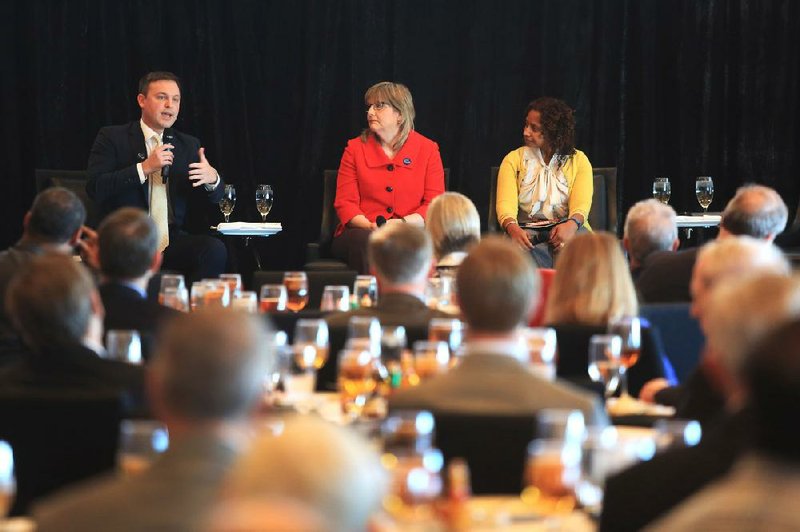Leaders of the Forward Arkansas initiative that is developing a set of recommendations meant to make the state's public schools among the best in the nation say that carrying out the plan, when it is ready, will be tough but well worth it to students and the state.
"If we don't take risks, we will be stuck where we are, and that has to be unacceptable to all of you," Sherece West-Scantlebury, president of the Winthrop Rockefeller Foundation, told the Little Rock Rotary Club 99 on Tuesday.
The Rockefeller Foundation, the Walton Family Foundation and the Arkansas Board of Education last year formed a partnership to develop recommendations for improving schools, along with college and career opportunities for the state's 485,000 public school students.
That plan, with its recommendations, is due in late spring or early summer. On Tuesday, West-Scantlebury, Kathy Smith of the Walton Family Foundation and Jared Henderson, the Forward Arkansas project manager, released a report of base-line information, "The State of Education in Arkansas, 2015."
The report gives the initiative's leaders, including a steering committee of more than two dozen Arkansans of diverse professional, economic and racial backgrounds, a foundation from which to work in developing the long-term plan of action.
"We want to work from data and facts and not from perceptions and opinions," West-Scantlebury said.
The initiative is seeking advice and ideas from the general public through an online survey, public meetings and forums, and focus groups.
"We can't do it alone," Smith said. "We want this to be Arkansas' plan," she added, noting that the data will be updated and reviewed yearly to "see how we are moving the needle."
The survey on public education, which consists of multiple-choice and open-response questions, will be available to the public until the middle of February on the Forward Arkansas website: ForwardArkansas.org.
The 36-page "State of Education in Arkansas" report was also on the website as of Tuesday.
In unveiling the base-line information report to the Rotary Club, Henderson said it celebrates strengths in the state -- including the access provided to families to pre-kindergarten programs, as well as a high school graduation rate and a college-going rate that exceed the national averages.
The state's 2010 adoption of a set of education standards that are common to most states and are intended to raise the bar on what students should learn was another strength cited in the report. Also highlighted is a per-pupil expenditure amount that is nearly at the national average and the state's assertive efforts to improve teacher and principal licensure programs.
Opportunities for improvement center on student outcomes, Henderson said.
"We aspire for so much more, he said. "We still have a lot of work to do," he added, noting that fourth- and eighth-grade student test results for the state are among the bottom 20 in the nation. And while the college-going rate is high, the state ranks near the bottom when it comes to completing degrees within six years.
Each region of the state has pockets of excellence and needs for improvement, Henderson said. For example, the southeast region has the lowest achievement levels but has also shown the greatest rate of achievement gains in recent years. The central region has the greatest gaps between high and low performers.
Arkansas is a state of working poor, West-Scantlebury said, based on research done previously by the Rockefeller Foundation. Some 70 percent of jobs in the state are moderate- and low-wage jobs that do not require postsecondary education, and 30 percent of jobs do require postsecondary education.
"That needs to switch," she said, adding that the way to make that change is with a solid plan for improving education.
In response to questions about the high rate of high school graduation and poor college performance -- including a high college remediation rate -- Smith said high schools can't be blamed by themselves for poor preparation of students. Students must be adequately prepared at all levels of schooling, starting with elementary school.
West-Scantlebury said the Forward Arkansas initiative is not just about preparing students for college; it's for both college and careers, including careers in the skilled and technical fields that often require testing and certification or licensure.
Metro on 01/28/2015

